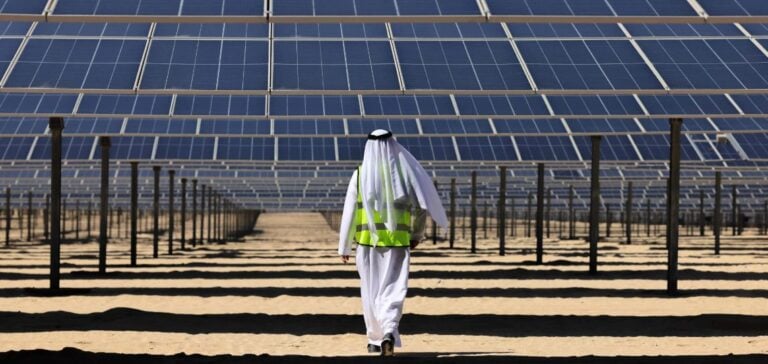The United Arab Emirates (UAE) has announced the launch of the world’s first large-scale project combining solar energy production and an advanced battery storage system. With a photovoltaic solar capacity of 5.2 gigawatts (GW) and 19 gigawatt-hours (GWh) of storage, this project aims to provide clean, uninterrupted energy 24 hours a day.
This development aligns with the UAE’s strategic vision to become a global leader in the energy transition and strengthens its role on the international stage. The project, located in Abu Dhabi, is spearheaded by Masdar and the Emirates Water and Electricity Company (EWEC) in collaboration with other strategic partners.
A Model for Clean Energy
The UAE President, His Highness Sheikh Mohamed bin Zayed Al Nahyan, presided over the launch ceremony, emphasizing the importance of this project in overcoming the intermittency of renewable energy. Through this innovation, the country aims to transform solar energy into a reliable, sustainable baseload power source.
Dr. Sultan Al Jaber, Chairman of Masdar, stated that this project represents a decisive step toward achieving the UAE’s carbon neutrality goals by 2050. It also reflects the leadership’s commitment to diversifying the national economy while meeting the growing energy needs of sectors such as artificial intelligence and advanced technologies.
Economic and Geopolitical Impacts
With significant investment and the creation of over 10,000 jobs, this initiative reinforces the UAE’s position as a hub of energy innovation. The integration of battery storage solutions not only improves the reliability of renewable energy but also reduces carbon emissions to an unprecedented level.
On a geopolitical level, this project positions Abu Dhabi as a key player in the global energy transition, meeting the goals of the Paris Agreement. Leveraging innovative technology, it sets a standard for other nations looking to develop sustainable energy infrastructure.
A Redefined Energy Future
The combined solar panel and battery storage facility represents a major breakthrough in the energy transition. It resolves challenges related to renewable energy intermittency and ensures continuous power supply for critical industries.
This project also underscores the UAE’s commitment to maintaining sustainable energy security while contributing to global decarbonization efforts. It will serve as a model for similar initiatives, solidifying the country’s leadership in the renewable energy sector.






















